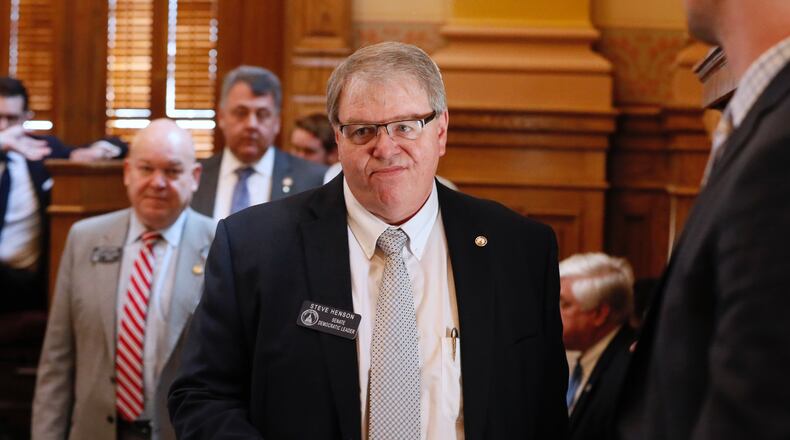We told you late Wednesday that state Sen. Steve Henson, the Democratic leader of his chamber, won't run for re-election in 2020. By the time he leaves the state Capitol, he'll have served nine years as minority leader.
Henson had a close call in the 2018 primary, but said his decision to put a cap on his Senate career was based on a need to attend to his off-campus business and his role as a recruiter of candidates next year. From yesterday's piece:
"I'm over 60 now, and I have to attend to some personal matters and my real business. Plus, as minority leader, I need to focus this next year on making sure Democrats pick up seats. And I don't want to be distracted by my own election," he said in an interview.
We’re already hearing names of potential candidates for Senate District 41, which includes the Stone Mountain area of DeKalb County as well as a slice of Gwinnett. The early list of tire-kickers:
-- Clarkston City Councilwoman Yterenickia "YT" Bell;
-- Kim Jackson, former associate rector at All Saints’ Episcopal Church in Midtown Atlanta;
-- Connie Stokes, the former DeKalb County Commissioner – who is also a former member of the state Senate. She ran for lieutenant governor in 2014.
You can’t help but notice that they’re all women -- 2020 is likely to be that kind of year.
***
Expect to see this creep into plenty of Gov. Brian Kemp's speeches over the next year: On Wednesday, CNBC ranked Georgia as the sixth best state for business, up one spot from last year. Click here for the list and the metrics the outlet used.
If this becomes a staple in his stump speech, he won’t be the first to use a ranking from the network as political fodder.
Five years ago, in the teeth of a re-election campaign, Gov. Nathan Deal slipped out of a trade delegation event in Israel to go to CNBC's studio in Tel Aviv to celebrate the state's top ranking.
***
We've mentioned that Georgia Democrats are likely to invest heavily in two-dozen or so state House races in 2020. Flipping the chamber is their best – perhaps only – shot at winning a seat at the table when redistricting comes around in 2021.
Control of the Legislature also means control of the congressional district maps that will determine the make-up of the U.S. House.
The AJC’s number-cruncher, Jennifer Peebles, has produced some quick details on what’s at stake in Georgia:
-- In November 2018, Democratic nominees for the U.S. House in Georgia, both incumbents and challengers, received a total of 1,814,469 votes, or 47.7% of all ballots cast;
-- All GOP nominees in those races received 1,987,191 votes, or 52.3% of all ballots cast.
-- Five members of Georgia’s 14-member U.S. House delegation are Democratic. The nine Republican members form a 64% majority.
Not all of the imbalance can be attributed to gerrymandering. The lifespan of Georgia’s current congressional district map, drawn in 2011, is about to expire. Metro Atlanta’s economy has chugged along since the Great Recession – and the new, younger job-seekers/voters are more likely to skew Democratic.
***
Our AJC colleague Scott Trubey has a good one today on where business meets politics. His lede:
When an Atlanta developer inked a deal in May 2017 to revitalize 145 acres of the former Fort McPherson, hopes were high the project would provide a boost to a slice of southwest Atlanta long starved for investment.
But two years later, the relationship between the government body overseeing Fort Mac and developer Stephen Macauley has soured, threatening to derail one of the city's largest redevelopment projects in an area still reeling from the recession and the 2011 closure of the Army post.
***
On Wednesday's edition of GPB's "Political Rewind," one topic of conversation was the decision by state Rep. Ed Setzler, R-Acworth, the author of Georgia's new restrictions on abortion, to engage in a three-month moratorium on fundraising.
Setzler reported raising only $265 since the 2019 session of the Legislature ended (though he has more than $18,000 in cash on hand). This was because, Setzler explained in all caps on his disclosure form, he was he was “sickened” by Democratic opponents who were using passage of HB 481 to raise cash.
In his debut appearance on “Rewind,” former Nathan Deal aide Chris Riley heaped praise on Setzler for his unconventional strategy. Riley called it a “shrewd” decision that could pay dividends for Setzler by grabbing more attention for him down the road. Other panelists weren’t so sure.
The discussion provoked us into looking at the reports of a few state lawmakers who fought the measure:
-- State Sen. Jen Jordan, D-Atlanta, reported raising $74,424.94;
-- State Sen. Zahra Karinshak, D-Duluth, lists her second-quarter contributions at $75,534.73;
-- And state Rep. Deborah Silcox, R-Sandy Springs, reported $24,600. Silcox is one of the few women among House Republicans who opposed the measure, and the only one targeted for a primary challenge by proponents of HB 481.
***
Newly-minted U.S. Senate candidate Ted Terry also made a "Rewind" appearance, and shared a bit more about why he entered the race now rather than run for governor, like he previously said he would.
The Clarkston mayor’s reasoning: Stacey Abrams seems assured to mount a rematch against Gov. Brian Kemp, and the field so far lacks a true progressive.
A scan of the headlines gives us a glimpse of how Ted Terry will be cast during this contest.
CNN focused on his "Queer Eye" appearance. The Washington Free Beacon seized on his "hipster mayor" moniker. Insider Advantage wondered whether a "far-left Democrat" could defeat incumbent Republican David Perdue.
The Latest
Featured






